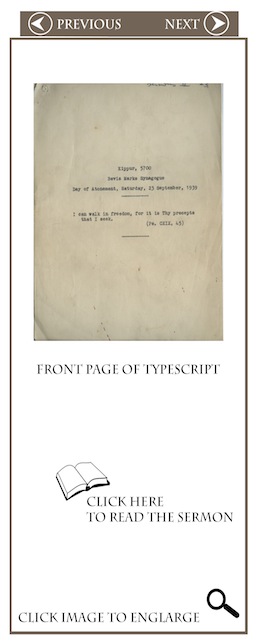
Herbert: 1 | 2 | 3 | 4 | 5 | 6 | 7 | 8 | 9 | 10 | 11 | 12 | 13 | 14 | 15 | 16
Object 11. Herbert's sermon on Yom Kippur, Bevis Marks
22 September 1939
Description:
“As you are, no doubt, aware, it is most unusual for a layman to occupy the pulpit in our Congregation; but the Gentlemen of the Mahamad feel that the exceptional position you occupy as a Jewish scholar and the personal regard in which you are held in the Congregation with which you and your [sic] members of your family have been prominently associated for generations affords them the opportunity of inviting you to address the Congregation at our Cathedral Synagogue on Kippur Day.”
With these words, Paul Goodman, the secretary of Bevis Marks, the oldest standing synagogue in Britain (completed in 1701) invited Herbert Loewe to deliver an address on Yom Kippur, 1938. One year later, he was asked to give a sermon in front of the Sephardi community at the Lauderdale Road Synagogue. Finally, he delivered it at the Bevis Marks Synagogue as he had done the year before.
“For the present we must remember that the outbreak of crime and violence which began in 1933 and which has ended in war, began gradually and, indeed, long before 1933. Little by little ancient standards were abandoned, morality was ridiculed and perverted: more and more people were habituated to deeds and doctrines which their consciences abhorred, until a point was reached when consciences became atrophied. The spiritual malady spread with the force of an epidemic…..Everyone can observe his neighbour, judge his neighbour and condemn his neighbour. He is less easily able and less prone to observe, judge and condemn himself….This day is the fortress which bars the assault on the moral and religious law. This day is the rallying point for the individual. So long as the individual holds out, the group cannot succumb, for the group is ineffective but for its component individuals. So long as the moral law and the religious law hold out, the individual remains firm and immune to mass-hypnotism. That is why we, everyone of us, as individuals must hold ourselves to account on this day of Kippur.” (pages 3-5)
Credits: Leopold Muller Memorial Library, Raphael Loewe Pamphlets Collection, shelfmark: Sermons II, 23

